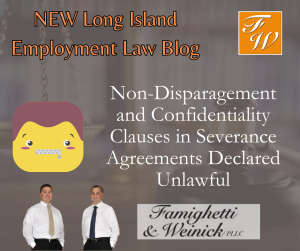When employers offer severance pay to a terminated employee, the employers typically require that, before receiving the pay, the employee sign a severance agreement. Severance agreements primarily are used to obtain a waiver from the employee of any legal claims the employee may have had against the employer, known as a general release. But, many employers also include non-disparagement and confidentiality clauses. Under a recent ruling from the National Labor Relations Board (NLRB), non-disparagement and confidentiality clauses are unlawful.
What are non-disparagement and confidentiality clauses and what does the NLRB’s ruling mean? Today’s Long Island employment law blog explains.
As noted, when employers often severance pay to an employee, the employee usually must also sign a severance agreement. The agreement sets forth the terms to which the employee must agree, in order to receive and keep the severance pay. Among the many provisions generally included in severance agreements is a non-disparagement provision.
Non-disparagement clauses usually look like this:
“Employee agrees not to make statements which could disparage or harm the Company, its parents, affiliates, officers, directors, employees, agents, or representatives.”
Basically, non-disparagement clauses prohibit employees from speaking badly about the employer. Even if lawful, such provisions can be objectionable and an experienced employment lawyer can negotiate the language of non-disparagement clauses and can oftentimes make the requirement reciprocal, meaning the employer must also agree not to disparage the employee.
Confidentiality clauses prohibit employees from disclosing the terms of the severance agreement. The language of a basic confidentiality clause reads:
“The employee agrees that the terms of this agreement are confidential and agrees not to disclose them to any third person, other than the employee’s spouse, attorneys, or tax advisors.”
Agreements usually provide for penalties if the employee violates the non-disparagement and/or confidentiality terms. Employers usually include penalties such as requiring re-payment to the employer of any severance payments made, attorneys fees incurred in connection with the breach, and injunctive relief, which means a court order directing that the employee comply with the non-disparagement terms.
Decisions from the NLRB in 2020 ruled that non-disparagement and confidentiality in severance agreements were lawful. In 2023, however, the NLRB reversed those decisions in the McLaren Decision. The problem, according to the 2023 decision, is that the National Labor Relations Act (NLRA) prohibits employers from taking actions which have a reasonable tendency to interfere with, restrain, or coerce an employee’s rights provided by Section 7 of the NLRA. One of those rights is the right of employees to be able discuss the terms and conditions of their employment with co-workers, and others. Indeed, the NLRB described this right as the “heart” of Section 7’s protected activity.
To preserve this right, the NLRB 2023 decision overturned the 2020 decision and ruled that employers who proffer a severance agreement with terms which restrict employees’ exercise of NLRA rights violate the NLRA. Applying the rule to non-disparagement agreements, the NLRA determined that such agreements can interfere with a former employee’s right to make public statements about the workplace.
Similarly, the NLRB ruled that confidentiality provisions can chill an employee’s right to report workplace violations to the NLRB and would further prohibit employees from assisting the NLRB in prosecuting claims against the employer. Further, confidentiality would prohibit the employee from discussing the terms of the severance agreement with coworkers.
A question left open by the NLRB was whether the new rules would apply retroactively to agreements that were already signed. In March 2023, the NLRB’s General Counsel issued a memorandum stating that the rules are indeed retroactive. Thus, to the extent an employer tries to enforce a non-disparagement or confidentiality term which was previously agreed to, the employee would have a claim against the employer for a violation of the NLRA.
For violations of the prohibitions against offering non-disparagement and confidentiality terms in a severance agreement, employees may be able to obtain an order from the NLRB that the employer cease and desist the unlawful conduct. Additionally, employees can recover money damages from any direct or foreseeable pecuniary harms.
One outcome of particular significance to employment litigation, is that the Board’s decision likely extends to cover settlement agreements. When an employment lawsuit ends by a settlement, the parties enter into a settlement agreement. That agreement, usually written by the employer, usually contains confidentiality provisions, and sometimes includes non-disparagement. These provisions may now be barred by the McLaren decision.
Employees presented with a non-disparagement and/or confidentiality clause in a severance agreement should speak to an experienced labor lawyer. Famighetti & Weinick PLLC is available to review severance agreements and to advise employees about provisions such as non-disparagement and confidentiality.
Employers who offer severance to employees should similarly first speak to experienced employment lawyers. Severance agreements are not only subject to the rules set forth by the NLRB, but they may also be subject to rules under anti-discrimination laws such as the Age Discrimination in Employment Act, as well as New York’s General Obligations Law.
Famighetti & Weinick PLLC’s employment lawyers are available at (631) 352-0050. More information about employment law issues is available on our Long Island Employment Law Blog.

Non-Disparagement and Confidentiality Clauses in Severance Agreements Declared Unlawful
 Long Island Employment Law Blog
Long Island Employment Law Blog

